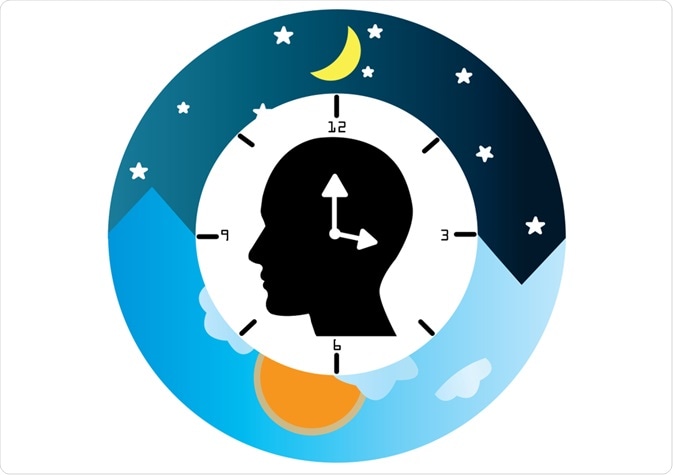What is circadian rhythm?
Circadian rhythm is the rhythm in which the cells of the body function within a 24-hour cycle. Each cell has a rhythm, and it is in line with the body clock. Circadian systems are crucial to the working memory of all animals and humans.

Image Credit: kanyanat wongsa/Shutterstock.com
What is Memory Recall?
Memory recall is how the brain processes information and can relay it later. This includes long-term and short-term memory.
To explain memory recall, a list of items could be given to an individual and they recollect the list one hour later. Memory relates to circadian rhythms, as memory recall can differ depending on the time of day.
How research has developed
Previously it was only recognized that the circadian rhythm was the daily cycle of our brains over 24 hours. There has been a focus on Circadian Rhythm in lifestyle, health conditions and sleep cycle.
Fruit flies were the first case that showed a periodic timing of circadian rhythms. Depending on the strain of the fly, the rhythms changed. The basis of circadian rhythm regulation was noticed in the fly strain, seeing the first clock gene in an animal.
Recent advances in research have discovered that circadian rhythm is endogenously generated and can be modulated externally by cues such as the weather. These rhythms are continually working in the brain. Studies suggest individuals can control their body clock and lead the tempo of circadian rhythms controlling daily behaviors dependent on events throughout the 24-hour cycle.
How research has developed and the advances today
There has been light in research, as now there is an understanding of the genetic and molecular systems of the processes in the brain.
Neurophysiology and memory formation work hand in hand when it comes to memory recall, as the molecules in the cognitive system are persistent. Meaning that various areas of the brain process different information; the memory is stored in the mammalian hippocampus, the memory center, and is most likely to be the area in which the circadian rhythms occur.
The circadian system can provide a platform for working memory. Typically functioning human brains are researched widely to look at how different time scales and lifestyles affect working memory.
Sequences are given to individuals at different times of the day and results are compared on lifestyle and other influencing factors. Circadian rhythm is responsible for people and animals to become receptive at different times of the day; if the circadian rhythm is altered in any it way, it can have adverse effects on brain functions.
Recent research on mammals
Recent research studied the memory recall and circadian rhythms in shift workers. The effects of exercise and circadian rhythms on working memory, a list of words were given to the participants at different times of the day.
In four 3-hour time slots, 9:30am, 12:30pm, 3:30pm, 6:30pm. Peak performance occurred at 12:30 pm, and the participants were at their poorest at 3:30 pm. After a brief 10-minute walk and 15-30-minute recovery, recall improved for all times that were inferior to the 12:30 time at baseline. Working memory and long-term memory, in this case, can be improved and is dependent on the circadian rhythm and exercise.
When the circadian system breaks down, memory seems to follow. Hamsters were the focal point of a study carried out by researchers at Stanford University. The brain releases a neurochemical GABA that allows for brain activity, is apparent in all animals.
GABA releases in time with the circadian rhythms controlling sleeping and waking cycles. In the experiment, the light exposure was manipulated, as the hamsters became more exposed to the light, they became unable to remember as they produced more GABA.
Problems found in the research
The research has shown that circadian rhythms and memory are strictly related and can easily be manipulated. However, comparing the mind to that of humans is slightly problematic as it fails to explain how humans with Down Syndrome, an over-inhibited brain, and the elderly have lost their short-term memory.
Although, it does suggest that it may be the case in older adults that their circadian rhythms are slowing down, and therefore short-term memory is affected.
It is not clear whether circadian rhythm and cognition are entirely related; however, it seems from research that it has a circadian rhythm that can affect memory recall.
Circadian rhythms can understand molecules and cells that provide a network into memory and allow researchers to develop lifestyles and seasonal changes in memory.
Sources
- Gerstner, J.R. and Yin, J.C., 2010. Circadian rhythms and memory formation. Nature Reviews Neuroscience, 11(8), pp.577-588. https://www.ncbi.nlm.nih.gov/pubmed/20648063
- Stanford biologists explore the link between memory deficit and misfiring circadian clock (2020). Available at: news.stanford.edu/.../memory-circadian-rhythm-111714.html
- Potter, D. and Keeling, D., 2005. Effects of moderate exercise and circadian rhythms on human memory. Journal of Sport and Exercise Psychology, 27(1), pp.117-125. www.researchgate.net/.../283821213_Effects_of_Moderate_Exercise_and_Circadian_Rhythms_on_Human_Memory
- Smarr, B. et al. (2014) "A time to remember: The role of circadian clocks in learning and memory.", Behavioral Neuroscience, 128(3), pp. 283-303. doi: 10.1037/a0035963. https://www.ncbi.nlm.nih.gov/pubmed/24708297
Further Reading
Last Updated: Mar 30, 2020